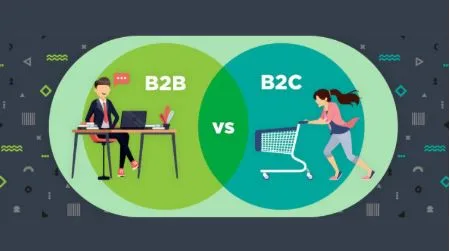B2B vs. B2C Marketing: The Impact of Artificial Intelligence
In the rapidly evolving digital landscape, Artificial Intelligence (AI) has emerged as a game-changer in both B2B (Business-to-Business) and B2C (Business-to-Consumer) marketing. While the ultimate goal in both domains is to engage customers and drive conversions, the strategies and tactics employed vary significantly due to the nature of their audiences. AI is transforming how businesses understand customer behavior, optimize campaigns, and deliver personalized experiences, but it does so differently for B2B and B2C marketing.
This article explores the nuanced differences in how AI impacts B2B and B2C marketing tactics, offering a comprehensive view of the opportunities, challenges, and future trends shaping each landscape.
Understanding the Basics: B2B vs. B2C Marketing
Before diving into AI’s influence, it’s crucial to understand the fundamental differences between B2B and B2C marketing:
- B2B Marketing targets decision-makers within organizations. The purchase journey is often longer, involves multiple stakeholders, and is driven by logic, ROI considerations, and long-term value.
- B2C Marketing targets individual consumers. The journey is generally shorter, more emotionally driven, and focuses on convenience, brand image, and instant gratification.
With these differing motivations and timelines, AI’s applications manifest uniquely in each context.
The Role of AI in Modern Marketing
AI in marketing refers to using machine learning, natural language processing, predictive analytics, and automation tools to improve customer experience, drive efficiencies, and enhance data-driven decision-making. Its core functions include:
- Personalization at scale
- Predictive customer analytics
- Chatbots and virtual assistants
- Dynamic pricing models
- Programmatic advertising
- Lead scoring and nurturing
These technologies are increasingly becoming the norm, rather than the exception, across both B2B and B2C domains.
Personalization: Precision vs. Emotion
B2B: Account-Based Personalization
In B2B marketing, personalization tends to be account-based. AI tools analyze firmographics, purchase history, and behavioral data to tailor website content for specific companies or industry verticals.
For example:
- AI-driven CRMs (like Salesforce Einstein) help marketing teams craft content specifically designed for stakeholders in particular companies.
- Predictive lead scoring powered by AI prioritizes accounts that are most likely to convert based on historical data.
This kind of precision ensures that B2B marketers are not wasting resources on low-value leads.
B2C: Individualized Consumer Journeys
In B2C marketing, personalization is more individual-focused. AI analyzes browsing patterns, purchase behavior, and social media engagement to deliver real-time personalized experiences. Many consumers enjoy AI-powered recommendations across platforms, Netflix and Amazon use AI to suggest content or products based on user preferences, while other engaging online content keeps users entertained and informed.
Examples include:
- Netflix and Amazon use AI to recommend content or products based on user preferences.
- E-commerce platforms use AI-powered dynamic ads that change depending on a consumer’s behavior across websites.
The goal here is to forge an emotional connection with the consumer and stimulate impulse buying through hyper-relevance.
Content Creation and Optimization
B2B: AI for Thought Leadership and SEO
B2B marketing heavily relies on educational content such as whitepapers, case studies, and blogs. AI tools like Content Marketing AI, Jasper.ai or MarketMuse help:
- Generate keyword-optimized content
- Analyze content gaps
- Predict content performance
AI also aids in summarizing complex industry data and generating insights that support high-value thought leadership campaigns.
B2C: AI for Creative Content and Engagement
In contrast, B2C marketing content is more visual and emotionally engaging. AI is used to:
- Auto-generate engaging social media captions
- Create product videos or Instagram reels
- Use sentiment analysis to tailor messaging
For instance, AI tools like Canva Magic Design or Lumen5 help automate visual content creation that resonates with a B2C audience.
Customer Segmentation and Targeting
B2B: Intent Data and Predictive Targeting
B2B marketers use AI to identify and target businesses with purchase intent. This is done through:
- AI-powered platforms like 6sense and Demandbase that collect intent data from online behavior
- Predictive analytics that recommend the best time to reach out or push campaigns
This strategic targeting helps reduce the sales cycle and increases ROI in high-value deals.
B2C: Behavioral Segmentation
AI enables real-time behavioral segmentation in B2C by analyzing click-through rates, cart abandonment, and social interactions. Based on this:
- Platforms like Google Ads and Facebook Ads automatically adjust targeting parameters.
- Real-time product recommendations are generated to suit each shopper’s profile.
This leads to more effective retargeting and increased conversion rates.
AI in Customer Support
B2B: Smart Assistants and Knowledge Bases
In B2B, customer service focuses on solving complex queries or system issues. AI assists by:
- Powering intelligent knowledge bases
- Providing tier-1 support through smart assistants (e.g., Drift, Intercom)
- Offering account-specific solutions through predictive case routing
This ensures enterprise clients receive timely and accurate support, improving long-term relationships.
B2C: AI Chatbots for Speed and Convenience
In B2C, support is more volume-based. AI-powered chatbots:
- Handle thousands of customer inquiries simultaneously
- Offer multilingual support
- Integrate with CRM to personalize support interactions
For example, e-commerce giants use chatbots for tracking orders, returns, and general inquiries, thereby enhancing user satisfaction.
Sales Funnel Optimization
B2B: AI for Lead Scoring and CRM Enhancement
AI optimizes the B2B sales funnel by:
- Scoring leads based on conversion likelihood
- Automating email follow-ups based on user activity
- Using AI-enhanced CRM tools for better pipeline management
Tools like HubSpot, Telecrm and Zoho CRM integrate AI for detailed funnel analysis, helping sales teams focus on high-value opportunities.
B2C: Conversion Rate Optimization in Real-Time
In B2C, AI is instrumental in:
- A/B testing website layouts and CTAs automatically
- Monitoring bounce rates and tweaking landing pages
- Sending optimized push notifications or emails at ideal times
All of these tactics contribute to reducing cart abandonment and boosting sales.
Ethical Considerations and Data Privacy
Whether in B2B or B2C, AI raises concerns around:
- Data collection and privacy
- Algorithmic bias
- Consent and transparency
B2B marketers need to ensure GDPR and industry-specific compliance, while B2C marketers face scrutiny over how consumer data is collected and used, especially in sectors like healthcare and finance.
Companies are now investing in ethical AI frameworks to ensure they maintain trust while leveraging these powerful technologies.
Future Trends: What’s Next?
For B2B Marketing:
- AI-Generated Proposals: Automated RFP responses and tailored presentations.
- Voice AI in B2B Sales: Smart assistants helping with real-time objections.
- Hyper-Automation: Seamless integration of AI across CRM, ERP, and marketing platforms.
For B2C Marketing:
- Augmented Reality (AR) with AI: Virtual try-ons in fashion and beauty industries.
- AI-Influenced Creators: Synthetic influencers and avatars generated by AI.
- Emotion AI: Tools analyzing facial expressions or voice tones to adapt marketing in real-time.
Both B2B and B2C sectors are increasingly embracing generative AI, which will redefine the boundaries of creativity, campaign execution, and customer interaction.
Conclusion
AI is not a one-size-fits-all solution, it adapts and enhances B2B and B2C marketing in distinctive ways. In B2B, the emphasis is on data-driven decision-making, account-based marketing, and long-term client relationships. In B2C, the focus is on high-volume personalization, real-time interaction, and emotional engagement.
For marketers, the key lies in understanding their audience and aligning AI capabilities to deliver the most relevant and effective strategies. As AI technology continues to evolve, its impact will only deepen, empowering both B2B and B2C businesses to achieve greater efficiency, insight, and customer satisfaction.






